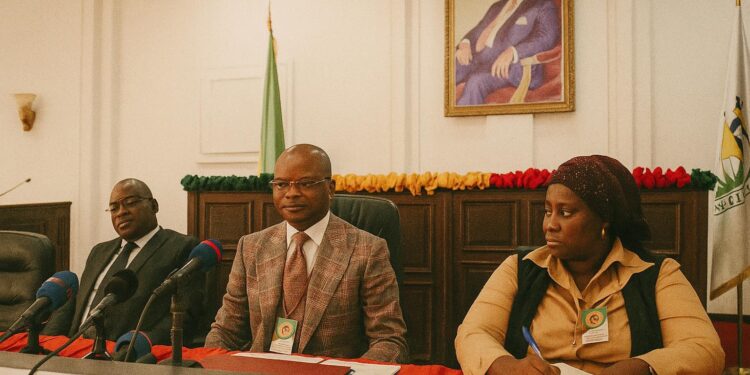Presidential Spotlight and Diplomatic Significance
On 19 July the marble atrium of Brazzaville’s Palais des Congrès will resonate with drumbeats and diplomatic protocol alike, as President Denis Sassou-Nguesso presides over the opening of the twelfth Pan-African Music Festival. His presence, confirmed by the presidential press office, underlines how cultural diplomacy remains a central pillar of Congo-Brazzaville’s foreign-policy toolkit, particularly at a moment when the region competes for creative-economy investment. The Head of State’s endorsement signals continuity with the inaugural 1996 edition, yet it also offers an implicit affirmation of national resilience amid an austere fiscal landscape.
A Festival Rescaled, Not Downsized
Commissioner-General Gervais Hugues Ondaye concedes that “budgetary prudence has shaped our blueprint”, but he insists the festival’s DNA remains intact. The week-long programme is compressed into three strategic venues—Palais des Congrès, ASECNA-Mayanga and the Kintélé Olympic complex—each selected for logistical efficiency and neighbourhood outreach. Twelve visiting delegations, from Senegal to Russia, have confirmed attendance, their expenses largely underwritten by home governments, a customary practice designed to shield Brazzaville’s treasury while preserving the event’s multinational character.
Digital Turn: From Vinyl Heritage to Streaming Algorithms
Under the theme “Music and Economic Stakes in Africa in the Digital Era”, FESPAM interrogates a paradox. Africa’s share of global streaming revenue remains under three percent, yet mobile data consumption on the continent is rising at double the world average (IFPI 2024). Scheduled masterclasses will dissect royalty-collection hurdles, metadata standardisation and AI-generated compositions, a subject that Mr Ondaye calls “both an existential threat and an untapped reservoir of creativity”. By convening start-up founders alongside veteran bandleaders, organisers aim to bridge the generational divide that often stalls monetisation.
Rumba as Soft Power and UNESCO Heritage
The Congolese rumba—inscribed on UNESCO’s Representative List in 2021—anchors the festival’s identity and offers Brazzaville a valuable public-diplomacy asset (UNESCO 2021). Culture Minister Lydie Pongault argues that “each riff of rumba carries the emotional memory of Central Africa” and can thus bolster country branding more effectively than conventional advertising. With Kinshasa-based orchestras co-headlining several evenings, the festival subtly rehearses a trans-Congo rapprochement, an aspect quietly welcomed by diplomats stationed along the Congo River.
Academia Meets the Stage
Parallel to the concerts, forty-four scholars representing fourteen universities will convene a symposium on creative-industry governance. Papers slated for discussion range from blockchain-enabled copyright registries to tax incentives for live-event infrastructure. The absence of the traditional African Music Market, cancelled for cost reasons, is partially offset by a virtual matchmaking platform developed with support from the African Development Bank’s Cultural and Creative Industries initiative (AfDB 2023). Delegates will test the prototype on-site, offering real-time feedback that may inform a continent-wide rollout next year.
Economic Realities and Policy Aspirations
Congo-Brazzaville’s macroeconomic environment remains constrained by post-pandemic debt servicing, yet officials at the Ministry of Finance view the festival as a modest stimulus for hospitality and transport sectors. A study commissioned after the 2017 edition estimated a multiplier effect of 1.8 on local expenditure, a ratio organisers hope to replicate despite the leaner format. The alignment with the African Union’s Agenda 2063, which earmarks cultural industries as a growth vector, gives FESPAM additional policy relevance (AU 2030 progress report).
Guarded Optimism Amid Regional Competition
From Kigali’s Trace Awards to Lagos’ Afro Nation, continental festivals proliferate, each vying for sponsorship from streaming platforms and beverage conglomerates. Brazzaville’s proposition rests on heritage authenticity rather than sheer scale. That strategy may insulate FESPAM from volatile sponsorship cycles, yet it demands consistent state stewardship. “We are calibrating expectations while safeguarding legacy,” Mr Ondaye reiterates, framing the reduced scope as an exercise in strategic patience rather than retrenchment.
Looking Beyond the Closing Chord
When the final encore fades on 26 July, organisers will confront the harder task of converting media impressions into sustainable revenue streams for artists. Success will be measured less by decibels than by the efficacy of follow-up mechanisms: cross-border touring circuits, updated copyright legislation and capacity-building partnerships with telecom operators. In foregrounding digital challenges without neglecting cultural roots, FESPAM 2025 aspires to chart a middle path—affirming the prowess of Congolese rumba while engaging the algorithmic future that awaits African music.











































